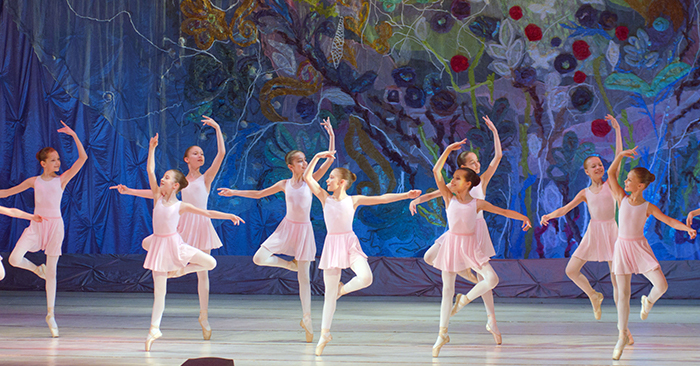It’s that time of year again: time for studios to showcase their students’ talent and put on a big show! And like any big event, there are bound to be a few (sometimes unwelcome) surprises. So it’s best to be prepared and in good spirits! Prepare your dancers for whatever situation might come up during a dance recital with the following tips.
1. Costume Issues
Whether it’s something relatively minor like a run in someone’s tights, or something more perilous like a broken strap, be prepared with a performance survival kit. You’ll want to have extra tights, shoelaces, bra straps and double-sided tape, a multipurpose tool to tighten taps, and any other items you need for potential repairs.
Hopefully you’ll be able to check the status of everyone’s costume during dress rehearsal, but it’s best to prepare your dancers in case a problem arises during their performance. For minor problems, coach them to keep performing – it will be more distracting if they try to fix the problem mid-dance. If you are truly concerned about how well a costume will hold up, have them wear a nude leotard as a base layer.
iSport’s Ballet section included a list of potential costume malfunctions that might come up, with some great solutions and tips to keep dancers dancing.
2. Stage Fright
Sometimes, dancers can get nervous – especially your youngest students! Make sure that everyone has had a chance to rehearse in the performance space. If you can simulate the performance experience by letting fellow dancers/staff act as an audience, even better. That way, you can encourage your dancers by reminding them that they CAN do their recital piece in front of a crowd – they already have!
If your dancers are still feeling stressed, have them try one of these 5 fast ways to relieve stress before a recital.
3. Forgetting Choreography
Hand-in-hand with pre-show butterflies are those moments on stage where a dancer might draw a blank and forget the next step. Many of us have experienced this firsthand, and know how upsetting it can be!
Dance Advantage recommends reminding dancers that they have practiced the routine, and know them so well that muscle memory will kick in once they relax! Encourage them by reminding them that they have prepared for this day, and if they focus on the dance and enjoy the moment, they will be fine! If they do happen to miss a step, coach them to jump right back into the dance, and shake off the mistake – learning to recover from a misstep is an important part of being a performer.
4. Makeup Mishaps
Makeup is just as important as the rest of the costume! And applying dance recital makeup is tricky, no matter how many years a performer has been dancing.
For younger performers, it’s best to let a parent volunteer apply the makeup AND be ready to clean up a smudge or other problem that comes up. If they need help, you can refer those parents to our guide on applying dance makeup to younger dancers.
For older performers, who might do their own makeup or may need to quickly make an adjustment in-between pieces, emphasize that the dance is key. Their dance recital survival kit should equip them with the critical Q-tip or baby wipe to adjust a smudge. But if they have long lashes that are threatening to block vision or throw them off, lose them and make sure the piece takes precedence!
We found a few great ideas at Dance Spirit for some “recital rescues” like addressing stained quick change clothes, or fast makeup solutions.
5. Music Woes
Music malfunctions can catch even the most experienced performers off guard. For older performers who may be able to more easily recover from a music glitch, encourage them to continue to perform if a sound issue arises. For younger dancers, instruct them to pay attention to their teacher, who hopefully is stationed nearby and can guide them in the event of a technical problem in the performance hall.
6. Unfamiliar Environment
As we mentioned above, it’s critical that performers be given a chance to rehearse in the performance space. Letting dancers acclimate to the stage, lighting, sound, etc. can go a long way towards alleviating related issues.
There are other environment-related considerations, however. Especially for younger or less-experienced performers, the dance recital day can be overwhelming due to the sheer number people, level of noise and change in environment. Experienced studio owner Misty Lown has some great tips on managing your backstage area in a way that creates a positive environment conducive to the success of your dancers.



